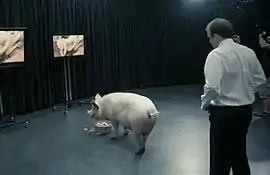The National Anthem (Black Mirror)
"The National Anthem" is the series premiere of the British science fiction anthology series Black Mirror. Written by series creator and showrunner Charlie Brooker, it was directed by Otto Bathurst and first aired on Channel 4 on 4 December 2011.
| "The National Anthem" | |
|---|---|
| Black Mirror episode | |
 A kidnapper pledges the release of a princess if Prime Minister Michael Callow (Rory Kinnear) has sexual intercourse with a pig. During the episode's production, various farm animals were considered before a pig was decided upon.[1][2] | |
| Episode no. | Series 1 Episode 1 |
| Directed by | Otto Bathurst |
| Written by | Charlie Brooker |
| Cinematography by | Jake Polonsky |
| Original air date | 4 December 2011 |
| Running time | 44 minutes |
| Guest appearances | |
| |
In the episode, a member of the British royal family is kidnapped and will only be released if the British prime minister Michael Callow (Rory Kinnear) has sexual intercourse with a pig on live television. Scenes follow government attempts to track the kidnapper, news coverage of the unfolding events and public reaction. "The National Anthem" had several inspirations, the idea originally conceived by Brooker years previous, with broadcaster Terry Wogan in place of a prime minister. It had a deliberately serious tone.
Reviewers identified themes including the spread of information across social media, the relationship between politicians and the public, and the role of news media. The episode garnered seven-day ratings of 2.07 million viewers, alongside many viewer complaints to broadcasting regulatory body Ofcom. Mostly positive professional reviews found the episode to be a good opener for the series, plausible in its storyline and well-acted, though some critics dissented. On average, reviewers have ranked the episode middling in comparison to other Black Mirror instalments.
The episode was later compared to Piggate, an anecdote published in the 2015 biography Call Me Dave, which alleged that British prime minister of the time, David Cameron, had placed a "private part of his anatomy" into a dead pig's head as an initiation rite at university.[1]
Plot
British prime minister Michael Callow (Rory Kinnear) is woken at night to learn that Princess Susannah (Lydia Wilson), a beloved royal, has been kidnapped. As ransom, the kidnapper demands that the prime minister have sexual intercourse with a pig, live on national television. These demands were posted on YouTube and have been viewed by tens of thousands of people, whilst the topic is trending on Twitter. In the morning, news media stop complying with a DSMA-Notice issued by the government which requested that they not broadcast the story. Within hours, tens of millions have seen the video.
Unbeknownst to Callow, Home Secretary Alex Cairns (Lindsay Duncan) orders Special Agent Callett (Alex Macqueen) to arrange for footage to be fabricated. Callett plans for Callow's head to be digitally composited on porn star Rod Senseless (Jay Simpson), a difficult task given the kidnapper's technical specifications for the broadcast. After a person at the studio tweets an image of Senseless, the kidnapper sends a news channel a severed finger and a video of Susannah writhing in pain as punishment. In a sharp change of opinion, a majority of the public now expect Callow to follow the kidnapper's demands, to the distress of Callow's wife Jane (Anna Wilson-Jones).
Meanwhile, an armed team raid a building from where the YouTube video was first uploaded, but it is a decoy. The journalist Malaika (Chetna Pandya) learned of the raid from a government staff member to whom she sent sexually explicit selfies. Having filmed the scene, Malaika is shot in the leg as she tries to flee.
Cairns tells Callow that he will jeopardise his public image and family's safety if he refuses to comply with the kidnapper. He reluctantly agrees. As a deterrent to viewers, a painful tone plays before the broadcast begins; possession of a recording will become illegal at midnight. Gravely, Callow has intercourse with a pig while 1.3 billion people watch.
Cairns is informed that Princess Susannah was released unharmed in London on the Millennium Bridge 30 minutes before the broadcast, a fact she keeps secret from Callow. The finger sent to the news station was actually the kidnapper's—Turner Prize-winning artist Carlton Bloom, who hanged himself during the broadcast. As Callow vomits in a toilet, ignoring Jane's phone calls, Cairns tells him that Susannah is safe. A year later, Susannah is pregnant and Callow's approval rating has improved. However, behind closed doors, he begs Jane to speak to him as she silently walks away.
Production
The executive producers Charlie Brooker and Annabel Jones began work on Black Mirror in 2010, having previously worked together on other television programmes. The series was commissioned for three hour-long episodes by Channel 4, taking its budget from the comedy department. Brooker's production company Zeppotron produced the show for Endemol.[3] "The National Anthem" was the first episode of Black Mirror to air, premiering on 4 December 2011 at 9 p.m.[4] The following two episodes, "Fifteen Million Merits" and "The Entire History of You", premiered a week and a fortnight later, respectively. "The National Anthem" was the third script to be pitched to Channel 4, the first of which was "Fifteen Million Merits" and the second of which was not produced.[5]
Conception and writing

The initial idea for the episode involved a celebrity carrying out the sex act.[6] Series creator Charlie Brooker had previously conceived of a short story where the broadcaster Terry Wogan would have to have "full sexual intercourse with a sow" on television in order to secure the release of a kidnapped princess, later mentioning the idea in a 2002 column for The Guardian.[7] Brooker later became interested in parodying the American action series 24.[6] Whilst working on the story, he realised it would not be humorous. Like his previous work Dead Set, a 2008 horror series about zombies, he decided to "take something preposterous but make the tone very straight".[2] The title of the episode refers both to "God Save the Queen", the UK's national anthem, and Radiohead song "The National Anthem".[2]
Brooker also took inspiration from a controversy where Gordon Brown called a member of the public "a bigot" after speaking with her, and also a Fabulous Furry Freak Brothers comic where he believed recalling that "a police chief is required to have sex with a hog".[1] Another inspiration was the reality show I'm a Celebrity...Get Me Out of Here!, particularly an episode where a celebrity was tasked with consuming a mixture of disgusting animal parts. Annabel Jones described the episode's topic as "humiliation and the public's appetite for humiliation".[2]
Brooker noted that other animals similar to a pig were considered for the sex act.[1] A duck was believed too small and absurd, whilst a horse or donkey would be too difficult for filming; Brooker also objected to a chicken.[2] Even considered was "a giant wheel of cheese", but a pig was chosen to "[straddle] the line between comic and horrifying."[1] A scene in which Callow spoke to Rod Senseless was removed, as its comedic style was out of place. Another cut scene showed Malaika taken to hospital and left on a gurney as the staff watch Callow have sex with the pig; removing this meant the setting of a hospital for some scenes was unexplained.[2]
Filming

Rory Kinnear stars in the episode as Prime Minister Michael Callow. Lindsay Duncan plays the Home Secretary Alex Cairns and Alex Macqueen plays Special Agent Callett, whilst Anna Wilson-Jones had the role of Callow's wife Jane. During the casting process, executive producer Annabel Jones was keen to hire non-comedy actors so that a humorous tone could be avoided. Director Otto Bathurst commented that the production's first choice for every role was hired. Callow's political party is not stated, though Brooker says his blue tie implies that he is a member of the Conservative Party, a right-wing party in Britain. Jones commented that it would have been easy to make the audience hate Callow, but the focus was on the public's appetite for humiliation.[2]
Filming overlapped with the London riots of August 2011.[2] Brooker and his wife Konnie Huq watched the filming of the scene where Callow has sex with the pig. Brooker reported that in the first take, Bathurst did not call "cut", and instead let Kinnear carry on getting closer to the pig, putting his hand on the pig's back, until Kinnear refused to go further.[2][8] The scene was completed in only a couple of takes and was never designed to be more graphic than the final cut.[2]
The scene in which Callow attacks Cairns was written to be "visceral", with Brooker noting that he was unsure how a prime minister would act in the situation, and Bathurst commenting that though Callow should be "kicked out of politics", his actions go without consequence. In regards to the scene in which Callow's wife expresses distress to her husband, Brooker registered surprise that some viewers were angry at her character. The scene was intended for her to "[communicate] how upset she is".[2]
Marketing
During UK pre-publicity, the central concept of a pig was deliberately unmentioned; the Channel 4 trailers, which were briefly run on ITV and in cinemas, also avoided mentioning this. This led to some viewers expecting a political thriller.[2] The episode aired in Australia in June 2013, a year and a half after the UK premiere, as part of Studio's "Festival of WTF!" A billboard featuring Callow about to have intercourse with the pig was shown in Kings Cross, New South Wales, in May 2013, but soon removed, with a spokesperson for the channel apologising and plans to show the image in print and online suspended.[9]
Analysis
"The National Anthem" is a black comedy and political satire, played straight as a drama.[10][11][12][13][14] Reviewers varied in finding the episode overall comedic,[10][13] or only finding humour in limited parts of the episode, such as Rod Senseless's character.[14][15] A theme identified in the episode was the spread of information amongst a country with both news media and social media such as Twitter.[10][12][15][16] Richard Edwards of GamesRadar+ wrote that "nobody has any control of the spread of information any more",[16] whilst David Lewis of Cultbox said that the society depicted was "so constantly bombarded with data that it is no longer able to process information".[12] Emily Yoshida of Grantland commented that this information is not making us better or smarter or happier".[17]
Reviewers also identified the relationship between politicians and the public as a key theme,[15] with Lewis describing the episode as an "exploration of the potency of public opinion".[12] Michael Ahr of Den of Geek commented that the internet serves as a "weapon of attack" in the episode,[15] whilst Jim Goodwin of Bleeding Cool noted that "anonymously vented opinions can not only fuel but also help form the actions of government".[13] Ahr believed that the episode is a "condemnation of empty rhetoric and slippery politicians",[15] and Edwards found it "scarily believable" that "politicians are no longer making decisions based on their own judgement, but on the way the story is trending on Twitter".[16] Additionally, Goodwin commented that viewers are made to examine "their own culpability in the media frenzies that surround such events" as that of the kidnapping.[13] Similarly, Corey Atad of Esquire found that the episode examines how mainstream news and social media can both "bring out some of the very worst in collective human instincts".[18] The result of the incident, according to John Crace of The Guardian, is that Callow "lost the love of his wife and gained the sympathy of the nation".[11] In regards to the plot twist that the kidnapper is a famous artist, David Sims of The A.V. Club suggested that the kidnapper views the recording of Callow "as a new form of artistic expression".[14]
The episode was compared to the American 1959 television anthology The Twilight Zone, a programme from which Brooker took inspiration.[10][14] Michael Hogan of The Telegraph made further comparisons to British political satire The Thick of It, with its "corridors-of-power voyeurism", and the British spy drama Spooks, with its "clock-ticking tension".[10]
Comparisons to Piggate
In September 2015, four years after "The National Anthem" was first broadcast, the Daily Mail published allegations that David Cameron—the British prime minister at the time—had placed a "private part of his anatomy" into the mouth of a dead pig as an initiation rite at university. The allegations came from an unauthorised biography of Cameron, Call Me Dave by Michael Ashcroft and Isabel Oakeshott. This incident is widely known as "piggate".[1] Black Mirror trended on Twitter following the Daily Mail article's publication,[19] and some people used the hashtag #snoutrage, which appears onscreen during the episode, to refer to the incident.[2][20] Brooker responded on Twitter on the day allegations were first made, denying prior knowledge and describing it the day after as "a complete coincidence, albeit a quite bizarre one".[1][21] Finding the story perturbing, he remarked that: "I did genuinely for a moment wonder if reality was a simulation, whether it exists only to trick me."[1]
Reception
Airing on Channel 4 on 4 December 2011 at 9 p.m., the episode garnered 2.07 million viewers, according to seven-day figures from the Broadcasters' Audience Research Board (BARB).[22] It was nominated for Best Single Drama at the 2013 Broadcast Awards.[23] However, out of television broadcasts in 2011, "The National Anthem" received the eighth-most complaints to Ofcom, a total of 145 ranging from the use of profanity to the themes of bestiality, kidnapping, suicide, terrorism and torture.[24] An additional complaint came from a woman featured briefly in a vox pop, whose claim of invasion of privacy was not upheld by Ofcom.[25][26]
Critical reception
The episode received mostly positive critical reviews. On the review aggregator website Rotten Tomatoes, it holds an approval rating of 100% based on 18 reviews, with an average rating of 9.00/10. The website's critics consensus reads: "This inaugural tale of political machinations and elite perversions works as a scalding satire and a nightmare of burgeoning technology gone awry, making it a perfect sampler for viewers seeking to step through the looking glass."[27] It received an A rating in The A.V. Club,[14] 4.5 out of five stars in The Telegraph,[10] four out of five stars in Cultbox,[12] and 3.5 out of five stars in GamesRadar+.[16] Ahr called the themes of politics and social media "prophetic".[15] Yoshida and reviewers at TheWrap both found it the perfect opener for Black Mirror,[17][28] with Ahr concurring that it was "an effective opener despite its off-putting premise".[15] However, James Hibberd commented that the episode is "divisive" and reported that fans often recommend beginning with a different episode.[29] The episode's premise, of the prime minister having sex with a pig, was called "devastatingly, horrifyingly simple" by Sims.[14] Edwards felt amusement initially, and later "revulsion and pity" as the episode progressed.[16]
Most reviewers found the episode plausible.[12][17] Sims commented that "every twist seems organic" and "every decision rational", leading the audience to overlook "the insanity of the premise or any minor plothole".[14] Yoshida believed that the episode has "an airtight internal logic",[17] and Lewis wrote that it was "exactly what you might expect to happen if the situation ever arose".[12] However, Crace found that the premise lacked credibility, and the episode was less believable as it progressed.[11] Edwards criticised that the episode does not provide new insight into social media.[16]
The acting received a positive critical reception, with Goodwin describing the cast as "high calibre".[13] Ranking Kinnear as Michael Callow to be the 10th best performance in the Black Mirror franchise, Brian Tallerico of Vulture reviewed that the episode only works due to Kinnear's "emotional commitment to the character and concept".[30] Hogan praised Kinnear's acting "particularly compelling" in his emotional journey "from disbelief to dutiful self-sacrifice".[10] Crace thought his character arc was "both touching and funny".[11] Lewis found him "dignified, stoic and – crucially – likeable",[12] with Goodwin describing him as "flawed yet entirely sympathetic".[13] Lindsay Duncan's role, as Callow's press secretary, was also received positively. Crace found her "understated" acting "a delight",[11] whilst Goodwin praised her "ruthless" performance.[13] Goodwin further praised Tom Goodman-Hill in his role of "the morally malleable face of political spin" and Anna Wilson-Jones as Callow's wife, for bringing "grounded emotional connection" to the episode.[13]
Black Mirror episode rankings
"The National Anthem" received middling rankings on many critics' lists of the 23 instalments of Black Mirror, from best to worst:
|
Other critics ranked the 13 episodes in Black Mirror's first three series, where "The National Anthem" received varied reviews:
- 1st – Mat Elfring, GameSpot[36]
- 5th (of the Top Ten) – Brendan Doyle, Comingsoon.net[37]
- 8th – Andrew Wallenstein, Variety[38]
- 10th – Jacob Hall, /Film[39]
- 12th – Adam David, CNN Philippines[40]
References
- Benedictus, Leo (21 September 2015). "Charlie Brooker on Cameron and #piggate: 'I'd have been screaming it into traffic if I'd known'". The Guardian. Retrieved 7 September 2017.
- Brooker, Charlie; Jones, Annabel; Arnopp, Jason (November 2018). "The National Anthem". Inside Black Mirror. New York City: Crown Publishing Group. ISBN 9781984823489.
- Brooker, Charlie; Jones, Annabel; Arnopp, Jason (November 2018). Inside Black Mirror. New York City: Crown Publishing Group. pp. 6–13. ISBN 9781984823489.
- Plunkett, John (12 February 2013). "Black Mirror nets nearly 1.6m viewers". The Guardian. Retrieved 10 December 2017.
- Brooker, Charlie; Jones, Annabel; Arnopp, Jason (November 2018). "Series One". Inside Black Mirror. New York City: Crown Publishing Group. ISBN 9781984823489.
- Mechanic, Michael (14 October 2016). "The Man Behind Netflix's "Black Mirror" Is Maybe a Little Too Good at Predicting the Future". Mother Jones. Retrieved 5 December 2017.
- Brooker, Charlie (2005). Screen Burn. Faber and Faber. pp. 191–192. ISBN 0-571-22755-4. Originally published in The Guardian, 5 October 2002.
- Jonze, Tim (19 October 2016). "Charlie Brooker: 'Someone threatened to smuggle a rifle through customs and kill me'". The Guardian. Retrieved 7 September 2017.
- "Controversial billboard will be removed, Foxtel says". news.com.au. 1 May 2013. Retrieved 25 December 2017.
- Hogan, Michael (4 December 2011). "Black Mirror: The National Anthem, Channel 4, review". The Telegraph. Retrieved 20 March 2020.
- Crace, John (4 December 2011). "TV review: Black Mirror; Mark Zuckerberg: Inside Facebook; and The Party's Over: How the West Went Bust". The Guardian. Retrieved 20 March 2020.
- Lewis, David (4 December 2011). "'Black Mirror' review: 'The National Anthem'". Cultbox. Retrieved 20 March 2020.
- Goodwin, Jim (4 December 2011). "Review – Black Mirror Episode One: The National Anthem". Bleeding Cool. Retrieved 20 March 2020.
- Sims, David (12 November 2013). "Black Mirror: "The National Anthem"". The A.V. Club. Retrieved 20 March 2020.
- Ahr, Michael (24 January 2018). "Black Mirror: How 'The National Anthem' Started It All". Den of Geek. Retrieved 20 March 2020.
- "Black Mirror "The National Anthem" TV Review". GamesRadar+. 5 December 2011. Retrieved 20 March 2020.
- Yoshida, Emily (14 November 2013). "Black Mirror Episode 1, 'The National Anthem': Pig Bang Theory". Grantland. Retrieved 20 March 2020.
- Atad, Corey (24 October 2016). "Every Episode of Black Mirror, Ranked". Esquire. Archived from the original on 15 August 2017. Retrieved 24 March 2020.
- Hooton, Christopher (21 September 2015). "David Cameron pig allegations: Black Mirror episode in which a prime minister has sex with pig sees sudden spike in interest". The Independent. Archived from the original on 18 June 2022. Retrieved 24 March 2020.
- Taylor, Chris (5 December 2018). "The darkest fake media in 'Black Mirror': A complete guide". Mashable. Retrieved 24 March 2020.
- Schroeder, Audra (21 September 2015). "'Black Mirror' is bookended by two eerily prescient political episodes". The Daily Dot. Retrieved 24 March 2020.
- "Weekly top 30 programmes". Broadcasters' Audience Research Board. Archived from the original on 16 December 2017. Retrieved 30 July 2021.
- "Broadcast Awards Shortlist 2013 revealed". Media Business Insight. 21 November 2012. Retrieved 3 February 2018.
- "Top 100 most complained-about TV shows of 2011". The Guardian. 16 December 2011. Retrieved 20 March 2020.
- "TV watchdogs clear Black Mirror". Chortle. 10 September 2012. Retrieved 7 July 2021.
- "Broadcast Bulletin Issue number 213" (PDF). Ofcom. 10 September 2012. Retrieved 7 July 2021.
- "Black Mirror: Season 1, Episode 1". Rotten Tomatoes. Fandango. Retrieved 21 September 2021.
- Donnelly, Matt; Molloy, Tim. "'Striking Vipers' to 'National Anthem': Every 'Black Mirror' Ranked, From Good to Mind-Blowing (Photos)". TheWrap. Archived from the original on 17 February 2018. Retrieved 24 March 2020.
- Hibberd, James (23 October 2016). "Every Black Mirror Episode Ranked (including season 5)". Entertainment Weekly. Retrieved 24 March 2020.
- Tallerico, Brian (11 June 2019). "The 12 Best Performances on Black Mirror". Vulture. Archived from the original on 2 July 2019. Retrieved 24 March 2020.
- Bramesco, Charles (21 October 2016). "Every Black Mirror Episode, Ranked". Vulture. Archived from the original on 12 March 2018. Retrieved 24 March 2020.
- Power, Ed (28 December 2017). "Black Mirror: every episode ranked and rated, from Striking Vipers to San Junipero". The Telegraph. Archived from the original on 1 January 2018. Retrieved 24 March 2020.
- Jeffery, Morgan (9 April 2017). "Ranking all 23 episodes of Charlie Brooker's chilling Black Mirror". Digital Spy. Archived from the original on 6 August 2018. Retrieved 24 March 2020.
- Page, Aubrey (28 October 2016). "Every 'Black Mirror' Episode Ranked From Worst to Best". Collider. Archived from the original on 2 February 2018. Retrieved 24 March 2020.
- Clark, Travis (10 September 2018). "All 23 episodes of Netflix's 'Black Mirror,' ranked from worst to best". Business Insider. Archived from the original on 11 September 2018. Retrieved 24 March 2020.
- Elfring, Mat (28 October 2016). "Black Mirror: Every Episode Ranked From Good to Best". GameSpot. Archived from the original on 16 November 2016. Retrieved 24 March 2020.
- Doyle, Brendan (17 December 2017). "The Top Ten Black Mirror Episodes". Comingsoon. CraveOnline. Archived from the original on 28 December 2017. Retrieved 24 March 2020.
- Wallenstein, Andrew (21 October 2016). "'Black Mirror' Episodes Ranked: Spoiler-Free Guide to Seasons 1–3". Variety. Archived from the original on 23 September 2017. Retrieved 24 March 2020.
- Hall, Jacob (28 October 2016). "Through a Touchscreen Darkly: Every 'Black Mirror' Episode Ranked". /Film. Archived from the original on 23 September 2017. Retrieved 24 March 2020.
- David, Adam (24 October 2016). "How to watch all 'Black Mirror' episodes, from worst to best". CNN Philippines. Archived from the original on 28 September 2017. Retrieved 24 March 2020.
.jpg.webp)
